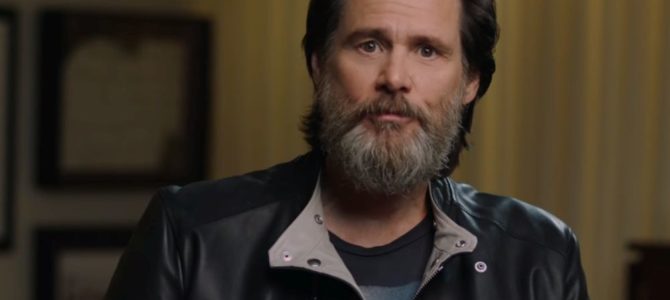
The most interesting new thing on Netflix is “Jim and Andy: The Great Beyond—Featuring a Very Special, Contractually Obligated Mention of Tony Clifton.” Don’t let the title throw you off. This is a documentary about Jim Carrey, the greatest comic actor of the ‘90s. Comedy is not what it was, and neither is Carrey, but he has emerged as the bane of Hollywood pretension and American celebrity worship.
It is regrettable to talk about him in the past tense, about his career as essentially over, but we must face facts, not least because we risk forgetting about Carrey too soon and not learning from him. The documentary shows him at the peak of his career, in 1999, filming “Man on the Moon,” the Andy Kaufman biopic directed by the famed Milos Forman. If you think of philosophy as the quest for self-knowledge, then this documentary reveals Carrey the philosopher, and we all have something to learn.
A Blend of Tragedy in Jim Carrey’s Comedy
For a brief period at the end of the ‘90s, Carrey transcended Hollywood vehicles in the direction of drama. He played crowd-pleaser characters somehow threatened with destruction by the love and demands of the crowd. Just the year before, in 1998, he had starred in “The Truman Show,” directed by Peter Weir, playing a character who is both the victim of the biggest, cruelest hoax in history and the miracle-worker of his country. He’s the unwitting star of a reality TV show. His life is not real, but he doesn’t know it.
Forman and Weir were the best directors he worked with, and both seemed to grasp that the importance of Carrey’s comedy is tied up with the audience’s faith in his essential decency. But that decency threatens to tear him apart as he realizes there is no happiness in store for him. He is trapped, and friendship and love are not within his reach—or if they are, they are also liable to be snatched away.
This is the essentially tragic character of life put on screen and the ground of the strange claim we learn from the original comic poet, Aristophanes, that comedy is superior to tragedy. Yes, it builds on tragedy and therefore needs it. Yes, it agrees that human happiness is frail and unreliable. But it proposes a new kind of hero, one who can live with the limits of being human, which no tragic character can.
So also Carrey. He does not propose to lie to us about tragedy with his sense of humor, but only to make it comprehensible and therefore bearable. This peak of artistic achievement allows Carrey in 2017 to reflect on himself and on America.
The footage shot on the set of “Man on the Moon,” finally released by Universal, simply shows what he means, so that you, too, can learn what he has learned. He’s learned that the self is an illusion. Lately, Carrey has become a weirdo, talking about God or the emptiness of fashion. This is not what normal people do, and certainly not what wealthy celebrities do. The documentary allows him to show that he always was a weirdo, looking for love in the wrong places while aware that he was doing a public service through his art.
The footage is both fun and astounding, full of the work Carrey put into doing justice to Kaufman while learning from him how an artist earns his freedom. Kaufman deserves a biopic because he acted out a certain heroism. Carrey wanted very badly to be that hero. I believe he ultimately failed, but you can judge for yourself. He does seem to have learned that Kaufman’s ultimately anti-popular comedy must eventually fail. He has, essentially, repeated that fate in his own career.
What’s Better than the World’s Adulation
“Man on the Moon” is just one piece of a puzzle, although important because it conceives of comedy as heroism. Carrey says his movies always reflected where he was in his life. This is probably true of all artists. Just ask the Oscars, for which he has never been nominated. The Academy unfailingly identifies great comic talent in Hollywood by ignoring it and failing to reward it. This is not to say his movies were all good or got better in time. Maybe all we can say is that he mastered his craft and eventually learned how to live.
This is important, as it shows that Carrey learned it’s better to have some self-knowledge and to be a human being than to have the world’s adulation, which condemns you to a combination of divinity and slavery. We see this as the defining characteristic of Carrey’s roles. They showcase men who begin to hate themselves because they are conformists. These learn to rebel and, in rebelling, learn it, too, is a form of conformism. That freedom means knowing the self is worthless. This is the kind of therapy that modern art can offer, free of flattery and full of the risks of rejection that scare people so badly.
In an age of social media and young generations ever less able to tolerate social pathologies or their own lack of effect on the world, Carrey is the comedian we need. It is worrisome to think that good comedy writers are almost extinct and good directors rare. If the movies were intended to do something good for America, Carrey would be the director of a comedy theater intended to deal with the catastrophe of humorlessness that is the secret truth about us.
These characters he has played are all-American and therefore already include the friendly warnings Alexander Solzhenitsyn shared with his American hosts, in his Harvard address. Underneath the niceness of American life is a howl of existential despair. Niceness attempts avoid the truth that there is evil in every human heart, even in suburbia, even in children, even in people with the best intentions.
This is why Kaufman was so important. His comedy taught Carrey, if not America, that being nice was the only sure way of forgetting the truth about who we are. We are doomed to desperately seek ourselves and our own importance while being unable to make sense of ourselves without each other. Our individuality and relationships are tied up inextricably and in a way we often mistake, and almost always in public life and in our public characters.
This, ultimately, requires not dissembling niceness, but the moral earnestness and intensity you can see in Carrey’s career. He played the fool to fool us, and played a mischief-maker to wreak mischief in us. He showed us the contradiction between our desire for respectability and our desire to be amused—our secret awareness that we’re pretty ridiculous. He dared ridicule us in a way no one dares today.
Just like Athens had Aristophanes, all democracies require comedy to keep the people from a bullying self-righteousness and from a desperation full of self-contempt. But amusing the people is not simply flattering them nor simply humiliating them. Mockery has to be mixed with patriotism and philanthropy. We can learn some of that again. We need it badly now.









